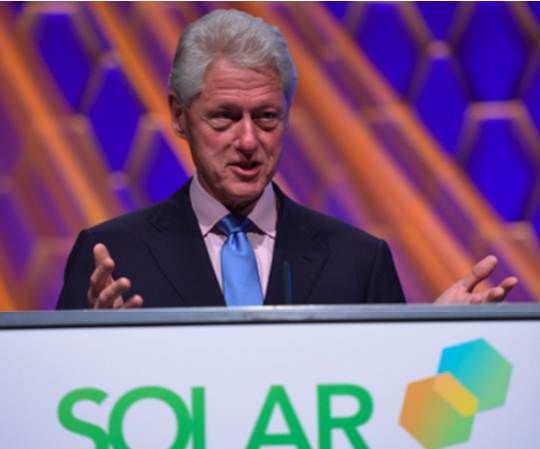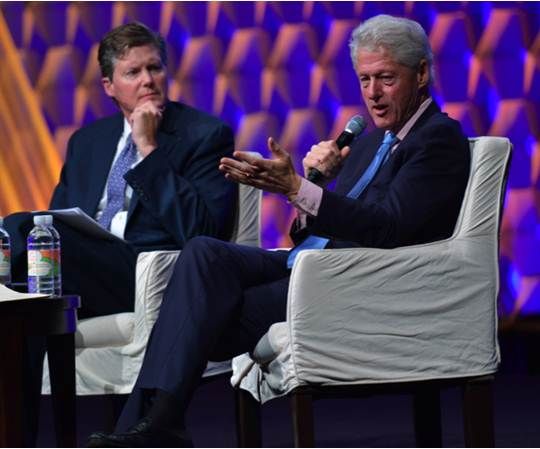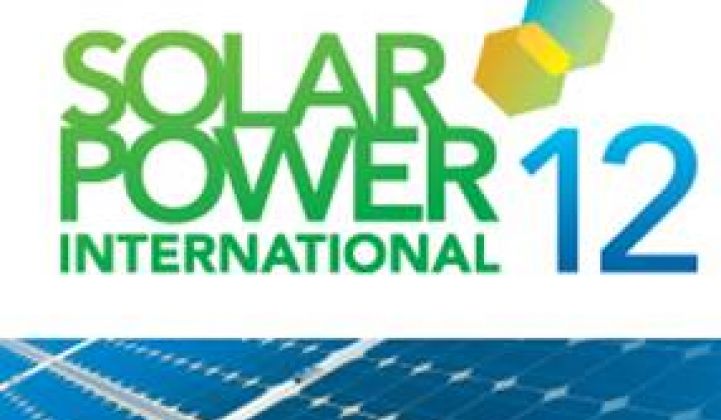He has only 308 solar panels on the roof of his presidential library, former President Bill Clinton announced at the opening of his Solar Power International 2012 keynote, and he is taking bids to drastically expand. “So if anybody wants in, send me an email.”
He then picked up the subject of creative cooperation he talked about at the Democratic National Convention.
To build “energy that is good economics, saves the planet from the worst consequences of climate change and promotes the national security of every country that is committed to clean, self-sustaining energy, you have to have cooperation between government and the private sector,” he said. “The constant mud fight, fact-free environment in which American politics often operates is counterproductive.”
He told a story about a minister who, during a sermon, excitedly told everybody in the congregation who wanted to go to heaven to stand up. Everybody but one little old lady in the front row did. "Sister Jones, the minister said, you are most devout member of our church. Don’t you want to go to heaven when you die?"
"She immediately jumped up," Clinton said, "and yelled, Yes! But I thought you were trying to get a load to go right now."
“Folks,” Clinton then said to the solar industry audience, “we need to get a load to go right now!”
To make that happen, he said, “Americans need to know more than they know now.” Most do not know that 100,000 people work in solar, that more people work in greentech than in coal, that in the depths of the recession, greentech grew at 8 percent, and that venture capital made the U.S. first in the world in greentech investment in 2011.

“To listen to the people on other side of this debate, you would think the President and his allies in Congress totally robbed the Treasury to subsidize bankrupt industries,” Clinton said, but “there are still $22 in subsidies for coal, oil and nuclear for every dollar invested in the clean energy future.”
Most Americans also don’t know, Clinton said, that the European countries that did the best during the recent financial crisis were those that had the most invested in greentech. Germany, he said, recently generated “from the sun alone, the equivalent of twenty nuclear power plants in a country where on average the sun shines as much as it does in London.” A Deutsche Bank study found, Clinton said, “the Germans have netted 300,000 jobs out of their commitment to a solar future.”
No government makes energy policy without public-private cooperation, he said. That creates “far more entrepreneurs, far more privatization, far more variation and creativity than any other way of energy development and electricity production.”
It was in what Clinton called George W. Bush’s “proto-socialist stage” as governor of Texas that the first tax credits went to wind developers, an incentive program that resulted in Texas being the leading wind state, with more installed wind capacity than all but a handful of countries.
“These are things people need to know,” he said. Greentech “is the direction people are going who are thinking about where the future is.” And, he said, “you represent the future. If we sell this as keeping America at the head of the future business, you will prevail.”

During a question-and-answer session with Solar Energy Industries Association President Rhone Resch, the former President turned to the subject of the Solyndra controversy.
It was, he said, “an innovative, interesting design” that ran into completely unforeseeable competition from unprecedentedly inexpensive imported Chinese silicon panels. It is important, he said, to get that basic fact out.
The bankruptcy, he said, “only represented less than 1 percent of the DOE’s investment in clean energy and it had nothing to do with tax credits.”
Take responsibility for the mistake, he told the solar industry, and provide context. “People accept the fact that the industry and the Energy Department made a mistake. Nobody does everything right.”
If a mistake stopped progress, he added, Neil Armstrong would never have walked on the moon because that happened two years after Apollo One burned up on the launch pad and killed three astronauts. And there would be no Mars rover now because that happened after the Challenger space shuttle exploded, killing its crew.
“You’ve got to take chances if you’re going to tomorrow’s dance.”
Resch asked Clinton how voters could choose between the presidential candidates. “Pay attention to what they’re saying,” he answered. “Politicians are more honest and hardworking than you think and they pretty much do what they say they are going to do.”
Clinton also advised the solar industry “to make sure in this political season that the candidates in both parties know what you’ve done,” adding, “make sure there are physical manifestations of it.”
He then recalled his efforts, beginning in 1977, to get Arkansas utilities to decouple energy efficiency improvements from rates. It took until 2010 for those utilities to seize that opportunity.
“You are going to bring America to a tipping point,” Clinton said. “You just need to bear down.” Sooner or later, he promised, “people will see this is good economics, helps in the climate change struggle and improves national security.”



